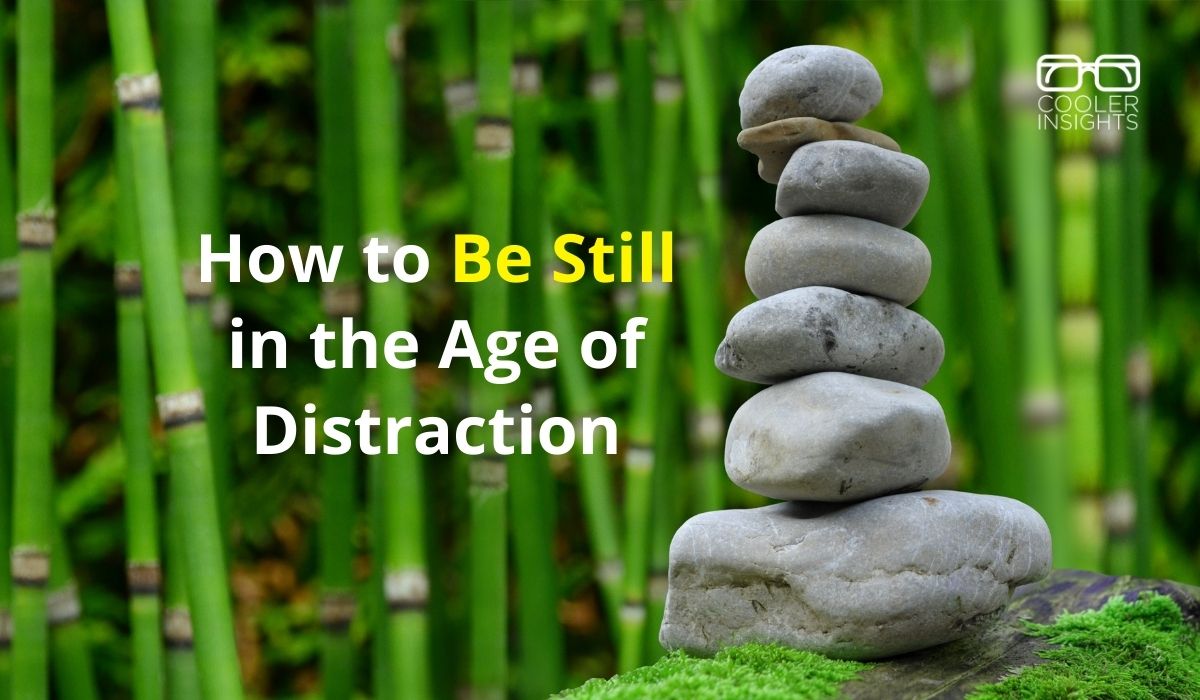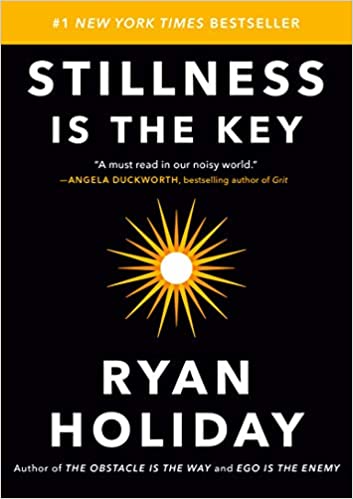
Find it hard to slow down and be still in our digital age? I certainly do!
As a digital entrepreneur and content marketer, my life is always on the go.
Tethered to my digital devices, I often find myself scrolling through social media feeds, responding to instant messages and emails, commenting on posts, crafting content briefs, and vetting articles, videos and posts.
Often, I feel frazzled, frustrated, and fatigued — while frenziedly trying to balance the multiple demands on my life.
In a moment of serendipity (or desperation), I stumbled on Stillness is the Key by serial author Ryan Holiday.
I was instantly blown away by the book’s timeless wisdom.
The same author who wrote Growth Hacker Marketing, Ryan isn’t a yoga guru or a Buddhist monk. Instead, he is one of the top influencers in online marketing and PR.
Unlike his marketing books, Stillness is the Key distills advice on living a more balanced, sustainable and holistic life by embracing the wisdom of Stoicism. The Stoics were an ancient school of philosophy who believed in four virtues in life — courage, temperance, justice, and wisdom. They adopted calmness and stillness as a counter-weight to the stresses and pressures of life.
In this article, you will learn the key principles in Holiday’s wonderful book.
Before we go on, however, take a few deep breaths. Settle in a comfortable chair. And relax.
Why We Need To Be Still
Slowing down and being still is the antidote to a restless and relentlessly revolving world.
It is the solution to digital distractions, content clutter, and that oh-so-common feeling of being overwhelmed in a hyper-busy society.
To achieve stillness, Holiday purports that we focus on three domains: our mind, our body and our soul.
#1 Stillness of the Mind
The first and perhaps most important dimension of stillness is the slowing of our mind.
a) Stay in the Present
How do we live in the present? Consider embracing the precepts of mindfulness.
Focus on your breath, on your surroundings, or the sensations that you feel around you. Don’t pull out your phone. Don’t ponder the past. Don’t fret about the future.
We’re called human beings — and not human doings — for a reason!
b) Reduce Media Consumption
Limit your time online. Switch off your phone at night and put it in a separate room before you sleep.
Turn off notifications on your smartphone (most of mine are off except for phone calls), and make yourself less immediately available.
c) Slow Down to Speed Up
This may sound like a paradox, but sometimes, the slower you react, the more effective your response will be.
Think through what’s truly important. Get some time alone to ponder and let your mind wander. Doing so will help you to think more deeply and come up with better solutions.
d) Empty Your Mind
Empty your mind, be formless. Shapeless, like water. If you put water into a cup, it becomes the cup. You put water into a bottle and it becomes the bottle. You put it in a teapot it becomes the teapot. Now, water can flow or it can crash. Be water my friend.” – Bruce Lee
Do you know that martial arts star Bruce Lee was a Zen Master?
Like him, you should empty all the rubbish in your mind so that you can think more clearly, coherently and calmly.
e) Write Daily
Before I became a digital marketer, I was a blogger. Through the habit of regularly journaling my thoughts and feelings, I was able to appease my mind and be more calm.
Writing a journal also helps you to reflect on what happened during each day. It cultivates gratitude, encourages self-evaluation, and helps you to deal with both emotional and intellectual problems.
f) Desire Silence
Silence is golden. The simple act of removing noise from our lives allow us to listen more deeply to what our hearts, our minds and our souls are telling us.
Go on a long walk (preferably without a digital device), or go running. Alternatively sit quietly in a secluded place and just reflect.
g) Seek Wisdom
Embrace continuous learning as a way of life. Look for the deeper answers to life’s troubles.
Ask yourself probing questions, and reflect on what your discover. Be humble. Be hungry for knowledge, and always challenge yourself.
Don’t let pride or conceit get into your head. Instead, be always willing to learn from mentors and teachers.
h) Eschew the Human Ego
Get rid of your ego — it has little value when you’re awash in stillness.
Be comfortable with your own skin. Do not be judgmental of others (or yourself). Learn to be objective in any situation. Be willing to challenge your own notions, and to change your mind — even if it hurts your pride.
i) Let It Go, Let It Go…
Cultivate a sense of detachment from what you do. Levitate above your circumstances. See the bigger picture, and do not let a temporary affliction influence your bigger goal.
By adopting greater mental flexibility, you’re able to step out of obsessive-compulsive behaviours.
#2 Stillness of the Body
How do we be still in our bodies — what the Bible declares as the “temple of God”? As the vessel for a supernatural being, our bodies need to embrace quietude.
a) Just Say No
Less is more. Often, we agree to too many projects and tasks, burdening ourselves with responsibilities that we cannot effectively fulfill.
Instead of saying yes to all requests, learn to say no. Consider the true costs of every job, every social gathering, and every binge-watching session. Eliminate distractions by downsizing your obligations.
b) Go For a Walk
Do you know that walking is a form of meditation? Each step that you take is a repetitive and ritualized action.
Walking also helps your mind to expand and strengthens your creativity while soothing your mind.
c) Establish a Routine
Make your daily habits a ritual. This may cover anything from what you eat, what you wear, what you should do in the mornings, what work to do first, etc.
Doing so not only makes your life more stable — it also frees your mind from having to expend cognitive energy on deciding what to do each day.
d) Be a Minimalist
Throw away stuff. The less physical clutter you have, the less mental clutter you will have.
Life simply and eschew excessive material possessions. Make room for people instead of things.
e) Seek Solitude
Make time to be alone. This could be as simple as walking alone in the park, or sitting in a cafe with a cup of coffee, or just sitting on your desk and pondering.
You can also use your exercise time to seek solitude.
f) Be Human
You are not a machine. You need adequate sleep and rest.
Get sufficient sleep each day. Take breaks whenever you need it. Nap if you feel tired and are able to.
Don’t push yourself too hard, because overworking is never the solution.
g) Get a Hobby
Do something physical that is different from what you do at work. Your leisure pursuit should be something that both challenges and relaxes you.
The best hobbies are rejuvenating and refreshing — they should not become work with its financial rewards, but be satisfying just for their own sakes.
h) Don’t Escape from Life
Being still doesn’t mean shutting yourself out from life. Escapism never helped anybody — on the contrary, excessively trying to be someone else or be somewhere else can ruin your life.
“When you defer and delay, interest is accumulating. The bill still comes due… and it will be even harder to afford then than it will be right now.” — Ryan Holiday
i) Take Courage and Be Brave
Act from a place of bravery. Do not waiver from doing good — even when the situation may present itself with some risk.
To do so, volunteer for a cause you believe in. Join a movement. Do something right. Serve others. Use your stillness to make the world around you a better place.
#3 Stillness of the Soul
Last, but certainly not least, we all need to quieten our restless inner voices — our souls.
a) Adopt a Virtuous Life
Virtues are important to the Stoics, providing a moral compass for the way our lives are lived.
Being virtuous means adopting the right ethics and moral behaviours in life. Always do what is right — eschew what is wrong.
b) Bandage the Wounds of Your Inner Child
Are you imprisoned by your childhood hurts? Are there emotional scars that continue to torment you through your adulthood?
Seek to soothe your past by being mindful of how you feel. Identify the roots of those feelings, and acknowledge them. Calling out your past hurts can help you to be more prepared for the present.
c) Control Your Desires
You’re not a beast to your impulses or your reptilian brain. Learn to control your lusts and desires by looking at the bigger picture.
“What will happen to me if I get what I want? Will it truly bring me long-term pleasure and gain?”
d) Be Contented
Enjoy what you have in life. Be satisfied with life’s little pleasures.
Celebrate your victories, and don’t be so caught up in the pursuit of more than you forget to appreciate the present moment.
Be grateful for what you have.
e) Savour the Beauty of Life
Slow down to observe the beauty of nature. See what’s beautiful and lovely around you.
This could be as simple as a flower blooming in the morning, or the smile of a baby, or the delectable fragrance of a freshly cooked meal.
f) Seek a Higher Power
Acknowledge that there is a greater divine presence. For me as a Christian, I believe that God is in control of what’s happening in the world today — no matter how unexplicable, or how mind boggling it may be.
Belief in a bigger omni-present being helps us to gain a better perspective of our life’s meaning.
“Be Still and Know that I am God” — Psalm 46:10
g) Build Relationships
No man or woman is an island. As social animals, our primary purpose isn’t just to survive in isolation, but to build strong bonds with those around us.
Find time to shower love on your family, friends and even strangers. This may take time, effort and sacrifice, but will be well worth it.
h) Vanquish Your Anger
Anger is the anti-thesis of stillness. It stings. It burns. It destroys.
Learn how to manage your anger. Breathe deeply or walk away from situations that may rile you.
Do not return an eye for an eye. Instead, replace it with generosity and kindness.
i) Everything is Interconnected
Finally, acknowledge that everything in the universe is connected. All is one.
By understanding the universality of those around us, we are better able to appreciate people and things that may appear different from us.
“Seek ye first to understand, and then to be understood” — Stephen Covey
Conclusion
Stillness is the Key is one of those great books which gets me thinking about resetting my life.
Although I’m no stranger to the power of disconnecting (read my article on Cal Newport’s work here), I still found it difficult to quell the voices in my head.
Thanks to Ryan Holiday’s book, I now have a way to combat the ills of digital age living.
I hope that this summary has helped you. Let me know if it did by leaving a comment below or on social media.


Really liked your post, so unformatted. I am always for your new posts.